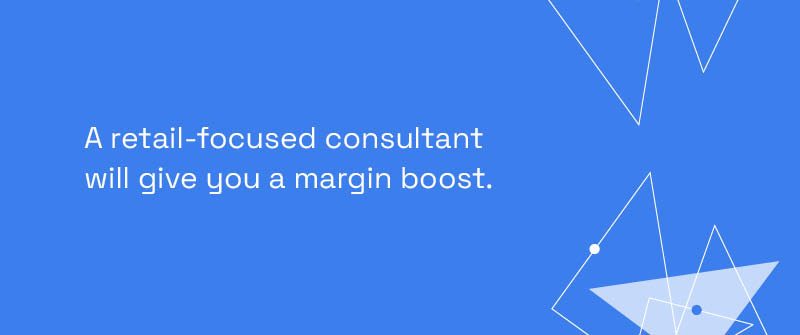
Ever feel like retail data is running you instead of the other way around? You’ve got POS data here, ecommerce transactions there, customer data in another system, and don’t even mention inventory or supply chain visibility feeds. It’s chaos. Meanwhile, the big guys—Amazon, Walmart, Target—are using data like it’s a crystal ball. They predict demand patterns before it happens, optimize prices by the minute, and squeeze margins like pros.
Here’s the good news: you don’t need enterprise budgets or endless timelines to fight back. What you need is smart Data Strategy Consulting and retail analytics expertise built for the industry. Done right, retail analytics consulting turns messy systems into clean signals, and fast. Done wrong, it’s months of meetings and invoices with nothing to show for it but another half-baked dashboard.
At P3 Adaptive, we’ve seen both. That’s why we’re obsessed with proving that mid-market retailers can use business intelligence strategy consulting services to move faster, smarter, and cheaper than bloated enterprise projects. Let’s break down how.
What Makes Retail Analytics Consulting Different from Generic Data Strategy?
Most industries wrestle with data. But retail? Retail is the heavyweight division. Every transaction spits out raw data in real time. Add in SKUs, promotions, ecommerce, returns, and consumer demand behavior, and suddenly you’re drowning in information with no life raft.
That’s why advanced analytics solutions for retail are their own beast. You’re not just asking, “What happened last quarter?” You need to know why your top-selling SKU suddenly tanked last Tuesday, or why online carts are being abandoned at twice the usual rate. That kind of agility isn’t optional—it’s survival.
Why Do Retail Companies Need Specialized Data Strategy Consulting?
Because retail math doesn’t wait. Your competitors are testing price changes by the hour. Your inventory is rotting if it sits too long. Your customers switch loyalties with one bad experience. A data strategy consultant who doesn’t understand those pressures will give you a pretty dashboard. A retail-focused consultant will give you a margin boost.

How Does Retail Data Complexity Compare to Other Industries?
Retail’s complexity isn’t just big—it’s unique. Compare it to other verticals and you’ll see why:
- Finance obsesses over compliance and risk, but transactions are predictable and highly structured.
- Healthcare juggles patient privacy and regulation, but demand doesn’t spike because it rained last weekend.
- Manufacturing has throughput challenges, but production cycles are measured in weeks, not hours.
Retail, on the other hand, is a living, breathing organism. Promotions, seasonality, weather, even TikTok trends can upend forecasts in real time. Your systems can’t just store data; they have to keep up with whiplash-inducing shifts. That’s why retail data strategy requires a consultant who can balance speed, accuracy, and practicality all at once.
What Should You Expect from a Modern Retail Data Strategy Consultant?
Not a three-ring circus of slide decks. Not a team of “associates” billing by the hour. You should expect someone who knows retail operations well enough to ask the right questions on day one.
What Questions Should a Good Data Strategy Consultant Ask Your Retail Business?
If a consultant only asks about your “data maturity model,” you’re in trouble. The right partner digs straight into the operational pain points that cost you money every day:
- Which decisions are you making too late?
- Where are you guessing instead of knowing?
- How much is inventory waste really costing you?
- What do your most profitable customers have in common—and how do you find more of them?
These questions might sting, but they’re supposed to. They shine a light on the gaps that separate good retailers from great ones. If your consultant isn’t willing to press here, they’re not helping you compete.
How Do You Know If Your Consultant Actually Understands Retail Operations?
Listen to their metaphors. If they talk about “data ingestion pipelines” before they talk about markdowns, inventory turns, or POS lag, you’ve got the wrong partner. A real retail data strategy consultant can connect data problems directly to sales floor reality.
How Do You Choose the Right Data Strategy Consulting Partner for Your Retail Business?
This is where the red flags start waving. Picking the wrong consultant isn’t just a mistake—it can stall momentum and burn budget fast.
What Red Flags Should You Watch for When Evaluating Data Strategy Consultants?
There are a few telltale signs that your consultant isn’t built for retail:
- They can’t explain ROI without a spreadsheet.
- They avoid timelines.
- They use more jargon than plain English.
- They promise a “comprehensive multi-year roadmap” before showing you a quick win.
One or two of these should make you cautious. All four? That’s a consultant who wants to camp out in your budget instead of fixing problems.
Why Do Most Traditional Consulting Approaches Fail for Mid-Market Retailers?
Because they’re built for enterprises with deep pockets and endless patience. Mid-market retailers don’t have either. You don’t need a six-month assessment phase. You need insights that cut costs or boost sales this quarter. Traditional consulting fails because it confuses motion with progress.
What Does a Successful Retail Analytics Implementation Actually Look Like?
Spoiler: it doesn’t look like perfection. It looks like progress—fast.
How Long Should It Take to See Real Results from Retail Data Strategy Consulting?
Weeks, not years. By the time you’ve sat through your fourth “alignment workshop,” your competitors have already adjusted their prices and stolen your margin. With the right analytics consulting services, you should see measurable results—better forecasts, cleaner inventory, higher-margin decisions—inside a quarter.
What Metrics Matter Most for Measuring Your Data Strategy ROI?
Metrics are where strategy gets real. Forget vanity numbers and dashboards that look good in board meetings but don’t move the needle. What matters most is simple:
- Inventory turns: moving product faster with less waste.
- Gross margin lift: better pricing, better promotions, better profitability.
- Customer lifetime value: finding and keeping the right shoppers.
- Speed to decision: cutting weeks down to hours.
When you measure the right things, you don’t just track progress—you build a story that justifies every dollar invested. If you can’t connect metrics to decisions, your data strategy is just window dressing.

The Cost of Doing Nothing
The “do nothing” option always looks cheaper on paper. But in practice, it comes with a hidden tax that shows up everywhere:
- Lost margin: running markdowns too late, overstocking what customers don’t want.
- Wasted labor: teams building reports that never get read because they’re outdated by the time they land.
- Stale customer insights: loyalty programs that don’t keep up with shifting behavior.
- Missed opportunities: by the time you spot a trend, your competitor already owns it.
Standing still with data is the same as falling behind. And the longer you delay, the harder it is to catch up. Boards don’t tolerate “we’re working on it” when sales are flat and costs are rising.
How Can Small and Mid-Market Retailers Compete with Data-Driven Giants?
By being scrappy, nimble, and smarter about where you invest. You don’t need 500 data scientists. You need the right foundation, the right strategy, and the right questions.
What Makes Modern Data Platforms Perfect for Agile Retail Companies?
Because they level the playing field. The Microsoft data platform and tools like Power BI don’t care if you’re Walmart or a regional chain—they deliver the same power. With the right Power BI consulting partner, you can connect POS, ecommerce, supply chain, and loyalty data into one view.
And here’s the kicker: modern platforms aren’t just powerful, they’re affordable. Fabric and Power BI let you unify data without investing in a sprawling, million-dollar stack. Mid-market teams can spin up live dashboards, automate reporting, and even bring in AI-driven forecasting without a battalion of IT staff.
That agility is a secret weapon. Giants move slowly because of complexity and politics. You can move fast because you don’t have the same baggage. In retail, speed beats size every time.
What Mid-Market Retail Leaders Are Getting Right
The best mid-market retailers aren’t necessarily the flashiest. They’re the ones who master the basics and do them relentlessly well:
- Centralize the chaos – They stop juggling spreadsheets and build a single source of truth across POS, ecommerce, and inventory. Suddenly, the finance team and the store managers are arguing with the same numbers—not different ones.
- Prioritize fast ROI – Instead of chasing a five-year roadmap, they look for quick wins. Trim waste this quarter. Boost margin next quarter. Build momentum one result at a time.
- Empower the team – They don’t hoard analytics in IT. They put Power BI and Fabric dashboards into the hands of merchandisers, marketers, and managers. When decisions move closer to the front line, the business moves faster.
These aren’t moonshots. They’re practical, repeatable steps that any retailer can take. And the payoff is massive when you stack them together. None of these require a monster budget or an army of consultants. They require focus, speed, and a willingness to start now instead of waiting for “perfect.”
The Bottom Line
Retail doesn’t give you the luxury of slow. Every delay is lost margin, wasted product, or a customer who clicked somewhere else. The giants may look unbeatable, but the truth is, mid-market retailers who embrace smart data strategy consulting services have an edge: agility.
Better is closer than you think. You just need a better map. And when you’re ready to move faster, we’re here. Contact P3 Adaptive today to get started and see how our team can help you turn data into a competitive advantage.
Get in touch with a P3 team member